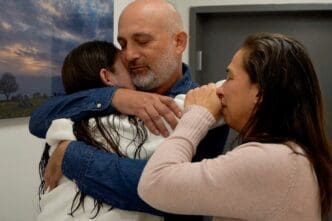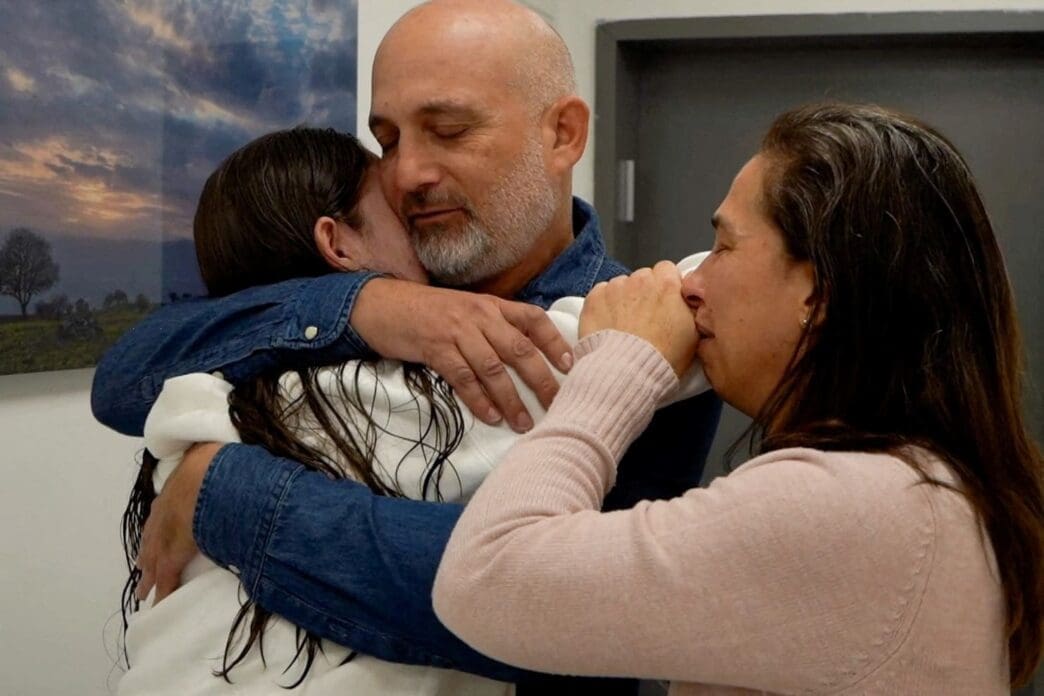JERUSALEM/CAIRO/GAZA – In a significant development, Hamas released four female Israeli soldiers on Saturday in exchange for 200 Palestinian prisoners. However, the failure to release another hostage led Israel to prevent the return of hundreds of thousands of Gazans to the heavily bombarded northern region of the enclave.
The four Israeli soldiers, identified as Karina Ariev, Daniella Gilboa, Naama Levy, and Liri Albag, were welcomed in Gaza City by a large crowd of Palestinians and numerous armed Hamas fighters. The soldiers waved and smiled before being escorted to Red Cross vehicles for transfer to Israeli forces.
Following the exchange, buses carrying the freed Palestinian prisoners were seen leaving the Israeli Ofer military prison in the occupied West Bank, with Israel’s Prison Service confirming the release of all 200 individuals.
The releases were met with joyful celebrations, with crowds cheering in Tel Aviv for the Israelis and in Ramallah for the Palestinians.

However, the situation soured when Hamas did not release a female Israeli civilian, leading Israel to halt plans for Palestinian returns to northern Gaza, which has been the hardest hit during the conflict. Hamas, which views the return of displaced Gazans as essential to the ceasefire, indicated that the hostage would be released next week and deemed Israel’s decision a violation of the truce.
The ceasefire agreement stipulates that Hamas will release 33 women, children, the elderly, and sick or wounded hostages over the initial six-week phase, while Israel will release 30 prisoners for each civilian and 50 for each soldier.
The four soldiers, abducted during the deadly attack on Israel on October 7, 2023, were seen on screens by their families at a military base nearby, eliciting tears of joy and cheers from parents and supporters in Tel Aviv, where hundreds gathered at a location now known as Hostages Square.
After their families reunited with them, the soldiers were flown to a central Israeli hospital, where emotional video footage captured their heartfelt embraces.

The 200 Palestinians released included individuals convicted of serious offenses, some serving life sentences for their roles in attacks that resulted in numerous Israeli deaths. Israel stated those involved in killings would not be allowed to return home, with about 70 slated for deportation to Egypt and potentially onward to other nations like Turkey, Qatar, or Algeria. Sixteen were sent back to Gaza, while others were released into the Israeli-occupied West Bank, where crowds in Ramallah celebrated their return.
Despite the joy in Israel, the disappointment of not freeing Arbel Yehud, 29, who had been kidnapped with her boyfriend from Kibbutz Nir Oz, cast a shadow over the celebration. An Israeli military spokesperson called the situation a breach of the truce, whereas Hamas labeled it a technical issue, assuring that Yehud was alive and would be released next Saturday.
Prime Minister Benjamin Netanyahu declared that Palestinians would not be allowed to return to northern Gaza until the hostage situation was addressed. Palestinian officials reported that up to 650,000 displaced individuals were awaiting their return to the northern region.

Tensions escalated when Israeli troops reportedly opened fire near crowds attempting to head north, resulting in a stampede that left one person dead and several injured, according to medics. The Israeli military stated that warning shots were fired to disperse gatherings they deemed threatening and claimed unawareness of any injuries.
On the coastal road, thousands lined up with their belongings, expressing frustration over the Israeli blockade by tanks. Zaki Kashef, 26, who sought to return to northern Gaza after sheltering in Deir Al-Balah for over a year, questioned, Where are the mediators? Why can’t they force Israel to respect the deal?
This ceasefire agreement, negotiated over several months with mediation from Qatar and Egypt and supported by the United States, marked the first halt in fighting in over a year.

Following Saturday’s exchange, 90 hostages remain in Gaza, with around a third of them declared dead in absentia by Israeli authorities. An additional 26 hostages are still expected to be released in the first phase, with negotiations anticipated for the remaining hostages, including military-aged men, alongside discussions regarding the withdrawal of Israeli forces.
Families of those still held worry about the potential collapse of the ceasefire. Some critics in Israel argue for the resumption of military action to prevent Hamas from regaining power in Gaza, while Hamas insists it will not release all hostages until the conflict ends completely.
Israel began its military operations in Gaza following the Hamas attack on October 7, which resulted in the deaths of 1,200 people and the abduction of over 250 individuals to Gaza, according to Israeli sources. Since then, Israeli military actions have reportedly resulted in the deaths of over 47,000 Palestinians in Gaza, while more than 400 Israeli soldiers have lost their lives in combat operations.
How Will the Recent Israeli-Palestinian Prisoner Exchange Affect Daily Life and Security in the Region?

- Cost of Living Implications: The ongoing conflict has disrupted the economy in both Israel and Gaza, leading to inflationary pressures and scarcity of essential goods. Gazans are the most affected, facing dire shortages of food, water, and medical supplies. With the blockade and destruction of infrastructure, residents may see rising prices for basic necessities, further exacerbating the already high cost of living in the region. As the situation escalates, families will struggle to make ends meet, leading to increased reliance on humanitarian aid and support from international organizations.
- Civil Rights Concerns: The treatment and rights of both Israeli and Palestinian citizens are under scrutiny, especially regarding the legalities surrounding prisoner exchanges and their implications for justice.
- Safety and Security: The unpredictable nature of the conflict raises concerns about daily safety for civilians in the region. The ceasefire is very weak, creating a precarious environment where tensions can flare up at any moment. Future military actions or retaliatory strikes could lead to further escalations, impacting the safety and security of everyday life for both Israelis and Gazans. Civilians may face increased risks of violence, displacement, and trauma, leaving many uncertain about their immediate surroundings and future stability. The volatility of the situation heightens anxiety and fear, making it difficult for communities to plan for the future.
- Healthcare Access: With many injured and displaced, access to healthcare in Gaza is strained. The war has impacted hospitals and medical resources, affecting the health and well-being of civilians.
- Community and Social Stability: The emotional and psychological impact of the conflict continues to affect families and communities, leading to a sense of instability and loss among those directly and indirectly involved in the crisis.








